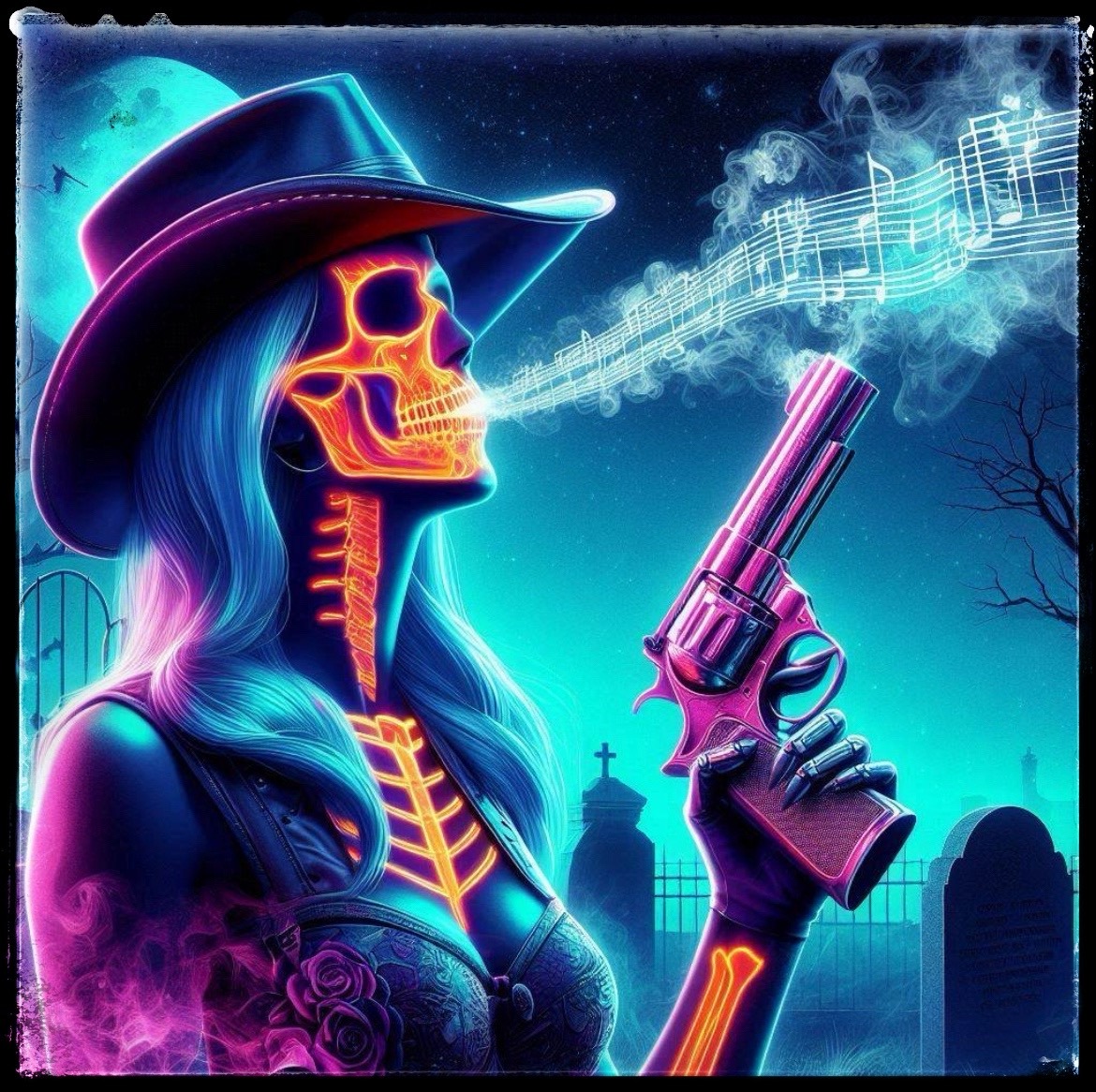TRANSLATING A FEMINIST TWIST INTO THE MURDER BALLAD
The modern murder ballad is a medieval inheritance, a contemporary translation of an old form of minstrelsy that titillated tavern patrons with poetically enhanced accounts of violent crimes and bloodied hands.
The earliest documentation of a murder ballad is a song printed in 1225 called “Fier Margrietken” (“Proud Maggie”), a favorite among bards who sang it for ale house audiences. The song was a recitation of a real-world crime in which a barmaid was brutalized and murdered just for walking in on a robbery as it was unfolding (Putter).
In the centuries that followed these early performances of “Proud Maggie” the appetite for songs about violence enacted upon ill-fated victims seemed insatiable. It is a craving that contemporary songwriters are still trying to satisfy by creating lyric narratives that highlight the human potential for extreme viciousness.
Today’s talented artists, however, are adding new twists to these musical horror tales and translating traditions of belligerence, domination, and misogyny into baleful blood-stained resistance narratives. They are giving us these lyrical treats in a wide variety of musical flavors across every conceivable genre — from bluegrass to the blues, from hard rock to hip hop.
Despite their great diversity, modern songs in the English language about the darkest of felonious acts are all in some way the offspring of a British musical tradition that has a paper trail extending back to the 1600s when profit-minded printers started producing “broadsheets” of dark songs that were “all the rage” in their day (Scanlon).
These bleak ballads were generally about romance gone wrong, lyric poems about jealousy translating into violent fury or betrayal spiraling toward hopeless despair. It was also not unusual for these songs to address the verities of survival in the hard times of famine, impoverishment, and warfare.
And then the British murder ballad took to the high seas as two centuries of emigrants boarded sailing ships and steamers to escape the strife of a nation shaken by internal colonization, religious rivalry, economic upheaval, and political crisis.
That is how a sober-minded style of lyric poetry migrated across the Atlantic to the rebellious North American colonies, beginning with the “Scotch-Irish” Protestant emigrants who had already experienced over a century of violent persecution as British subjects. The trove of musically expressed misery they carried to North America would grow darker with subsequent waves of mostly Catholic refugees fleeing the famine and death forced upon Ireland by two centuries of English imperialism.
The most impressive of these ballads brought to North America have been long-lasting enough to become “traditional” songs that would over time be adapted to local conditions and send rhizomes throughout the cultural soil tended by generations of Anglo-American landowners and laborers.
A typical example of this musical transition is “The Oxford Girl,” a Scottish ballad about a senseless 1683 murder that would become “The Wexford Girl” in Ireland and cross the Atlantic to become “The Knoxville Girl.”
A similar trajectory of a murder ballad transported and translated across distance and time is “Pretty Polly,” a song that caught popular notice when folk singer Judy Collins recorded it in 1968. Few knew that this song about the meaningless murder of a young woman who trusted the wrong man was just the latest incarnation of “The Gosport Tragedy,” a song composed in the early 1700s and published in broadside form under various titles.
“Pretty Polly” underwent subtle changes as it transitioned through modern American audio recordings from the early 1920s to the 1970s. The variations in the lyric narrative highlight the restrained diversity that develops when a text meant to be performed is translated across time, culture, and region. Psychedelic rock artist David Lindley even went so far as to record a version of the song in which the victim turns the tables on her would-be killer and slashes his throat with a razor — “a motion so quick that no shadow was made” — leaving the murderer to occupy the prepared grave intended for his victim (Wikipedia: Pretty Polly).
In 2020 “Pretty Polly” experienced another interesting translation when the African crossover band “The Congo Cowboys” recorded the song in the Bantu language of Lingála, enriching their version with a Congolese musical style.
Unfortunately, “Pretty Polly” also presents itself as an example of what feminist critics find so distasteful about the traditional murder ballad: the murdered girl trope that blames and shames the female victim.
“Usually, ballads are written to tell women how to behave,” says Courtney E. Smith, creator and host of the “Songs in the Key of Death” podcast (Jackson). A large number of these ballads, once called “lust ballads” or “jilted lover ballads,” have carried the misogynistic assumption that the woman is to blame for the man’s enactment of violence upon her body. The female victim in many of these songs is portrayed as some sort of demonic “femme fatale who men can’t control themselves around,” Smith says (Jackson).
The traditional Appalachian ballad “McAfee’s Confession” offers a most vivid example of the notion that the female temptress is responsible for the masculine move toward violence. Narrated by the husband about to be executed for having poisoned his wife just to get her out of the way so he could pursue another woman, the guilt-ridden killer finds a way to blame his mistress for his pre-meditated act: “She stole my heart, she stole my will/ And my poor wife caused me to kill” (Ozark Folksong Collection).
“McAfee’s Confession,” however, was never recorded by a major music label — unlike “Lily of the West,” a traditional murder ballad that has been frequently interpreted by a number of admired musicians. Like “McAfee’s Confession” and other traditional murder ballads, “Lily of the West” carries within itself the misogynistic implication of the female as being responsible for the moral corruption of the male protagonist.
Broadsides published throughout Britain during the early and mid-1800s show that “Lily of the West” moved from England to Scotland before jumping to Ireland and onward to North America. The ballad takes the narrative point of view of a man facing execution for having slain the man he viewed as his “rival” for the affections of the flirtatious and “faithless” Flora, the titular “Lily of the West.”
The song was brought into the modern cultural consciousness by performers as prominent as Joan Baez, Bob Dylan, Mark Knopfler, Rosanne Cash, the Chieftains, and the folk music trio Peter, Paul, and Mary. There is even a Croatian language recording of the song, titled “Usne Vrele Višnje,” by Yugoslavian rock singer Branimir Štulić (Wikipedia: Lily of the West).
Harold Schechter points out how a handful of current recording artists have pushed back against the erasure of the female perspective by composing their own murder ballads and having the woman do the killing. The rewriting of the narrative “reflects major, major changes” that Schechter sees as “healthy” for society and women (Jackson).
One of the earliest shifts in this direction was the 1899 song “Frankie and Johnny” which was written about the trial that year of Frankie Baker, a prostitute who was acquitted of killing her pimp after successfully arguing “self-defense.” In most recordings of the song, however, the narrative ends with Frankie being condemned to death (Anderson). The balladeers would allow a woman to fire a gun, but not give her the freedom that the real Frankie Baker was granted.
This cultural tendency to withhold deadly authority from female protagonists was challenged by a handful of recording artists from 1960 to 2020, but the most “successful” of these feminist murder ballads would be “Goodbye Earl” by The (Dixie) Chicks.
A delightfully bouncy revenge narrative by songwriter Dennis Linde, “Goodbye Earl” as recorded in 2000 by the all-female Country music band would become a chart-stomping smash — making its way into the Billboard Top 20 list of best-selling pop songs and reaching No. 13 on the Billboard Country Music rankings (Wikipedia: Goodbye Earl).
“Goodbye Earl” unabashedly celebrates the revenge killing of an abusive husband.
Both the lyrics and the music have fun with the assumption that “execution” is the most effective means of dealing with a repeat offender: “Earl had to die!” The song is rich with sarcasm as the vengeful wife and her childhood friend tease the corpse of the abuser they have poisoned. The women express no guilt.
Troubling questions and controversy followed the song’s release, with some radio stations banning it from the airwaves and others broadcasting information for abused women seeking help. The album likewise carried the warning label: “The Dixie Chicks do not advocate premeditated murder, but do love getting even.”
Their brutal and forthright honesty would be a defining aspect of the four feminist musicians from Texas — individually and as a band. And while The (Dixie) Chicks would court controversy in other songs attuned to the sociopolitical crises of their day, it is possibly their bouncy murder ballad (and the accompanying music video) that most effectively gave voice to the growing confrontational mood that continues to define contemporary sociocultural divides throughout the modern world.
That mode of seeing violence as a solution to violence translates as entertainment when delivered in a musical format, but like so much of the finest work growing from within the Horror Genre these artistic products can also be the starting point for deeper examinations of the ideals that drive our modern societies.
The next installment of this column will continue this examination of the murder ballad as a unique form of artistry. For readers who are interested in this subject, a greatly expanded version of this column with links to all the songs mentioned is available at the “Hu Reads Horror” blog at the post titled “Murder Ballads & the Feminist Twist” at: (https://grandfatherhu.wordpress.com/2024/07/10/murder-ballads-the-feminist-twist/). You may also be interested in visiting the writer’s personal journey through the category, including a look at how the murder ballad contrasts so sharply with the more lighthearted themes that dominated the popular music scene throughout the Fifties, Sixties, and Seventies. For those reflections you can look at the “Bubble Gum Bereavements” post (https://grandfatherhu.wordpress.com/2024/06/27/bubble-gum-bereavements-part-1/) and the intimate reflections offered up at the “Inheritance of Ephemerality” blog post (https://foxpods.blogspot.com/2024/07/the-inheritance-of-ephemerality.html) at one of the writer’s earlier blog sites.
Works Cited
Anderson, Tonnia L. “Frankie and Johnny: Race, Gender, and the Work of African American Folklore in 1930s America by Stacy I. Morgan.” Book Review. The Journal of Southern History. Vol. 84. No. 2. 2018. Online. https://muse.jhu.edu/article/692685
Jackson, Ashwanta. “Murder Ballads are a Window into the History of Violence Against Women.” Crime Reads. Website. 23 Sept 2021. Online. https://crimereads.com/murder-ballads-are-a-window-into-the-history-of-violence-against-women/
Ozark Folksong Collection. “McAfee’s Confession.” Digital Collections: U of Arkansas. Online. https://digitalcollections.uark.edu/digital/collection/OzarkFolkSong/id/1009/
Putter, Ad. “Fier Margrietken: A Medieval Ballad and Its History.” The Singer and the Scribe. Brill: Leiden, The Netherlands. 2004. Pgs. 69-88. E-Book ISBN: 9789401202299. Sample online: https://brill.com/display/book/9789401202299/B9789401202299_s008.xml
Scanlon, Kelly. “A Brief History of Murder Ballads.” Far Out Magazine. 6 Dec 2023. Online. https://faroutmagazine.co.uk/a-brief-history-of-murder-ballads-the-oldest-form-of-crime-literature/
Wikipedia. “Goodbye Earl.” https://en.wikipedia.org/wiki/Goodbye_Earl
Wikipedia. “Lily of the West.” https://en.wikipedia.org/wiki/Lily_of_the_West
Wikipedia. “Pretty Polly.” https://en.wikipedia.org/wiki/Pretty_Polly_(ballad)
Also, read Wyrd Words: Personal Reflections On the Art of Horror (Part VIII) by Grandfather Hu and published in The Antonym:
WYRD WORDS: PERSONAL REFLECTIONS ON THE ART OF HORROR (PART VIII) — GRANDFATHER HU
Follow The Antonym’s Facebook page and Instagram account for more content and exciting updates



























0 Comments